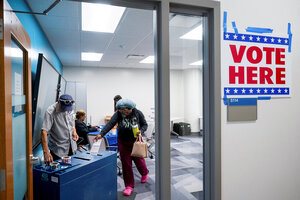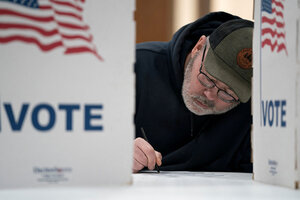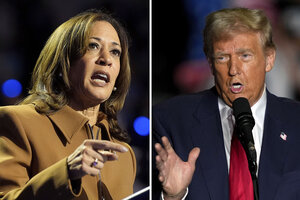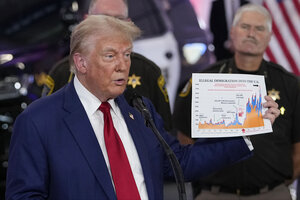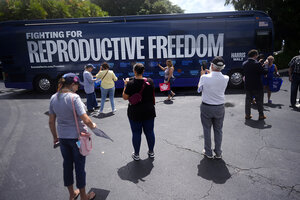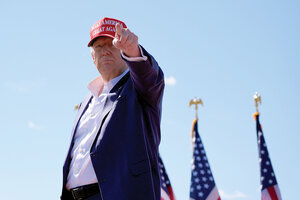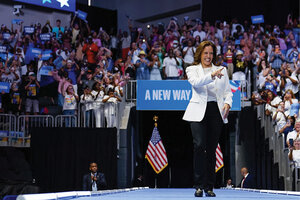Congress uncovers major Secret Service failures – and urges change
Loading...
| Washington
Despite heightened partisan tensions heading into a consequential election, Congress has put aside its usual divisive rhetoric to investigate the dual Trump assassination attempts in a serious, bipartisan way.
A House panel held its first hearing Thursday. Members of local law enforcement who were working at the Butler, Pennsylvania, site when former President Donald Trump was shot and nearly killed on July 13 helped lawmakers piece together a series of failures in planning, coordination, and communications.
Why We Wrote This
Key details are emerging from both a House hearing and a Senate report on Secret Service lapses in security for presidential candidates. A bipartisan effort in Congress aims to identify and fix systemic problems.
The overall thrust of their testimony corroborated an interim Senate report released Wednesday that found “foreseeable, preventable” failures.
These congressional investigations aim to uncover not only what went wrong but also any systemic reasons for such mistakes.
Untangling such problems, some due to chronic understaffing as well as increased operational demands on the Secret Service, will take time. But both the agency and lawmakers recognize the need to act immediately to prevent a potentially explosive act of violence so close to Election Day.
“We must be united in our belief as Americans – not as Republicans or Democrats – that political disagreement is settled through rigorous debate, not violence,” said Rep. Jason Crow of Colorado, the top Democrat on the House panel.
Despite heightened partisan tensions heading into a consequential election, Congress has put aside its usual divisive rhetoric to investigate the dual Trump assassination attempts in a serious, bipartisan way.
“We must be united in our belief as Americans – not as Republicans or Democrats – that political disagreement is settled through rigorous debate, not violence,” said Rep. Jason Crow of Colorado, a retired Army Ranger and the top Democrat on a bipartisan House panel that held its first hearing Thursday. “This task force has a solemn, urgent responsibility to uncover the failures and help stop them from being repeated.”
At the hearing, members of local law enforcement who were working at the Butler, Pennsylvania, site when former President Donald Trump was shot and nearly killed on July 13 helped lawmakers piece together a series of failures in planning, coordination, and communications. The overall thrust of their testimony corroborated an interim Senate report released Wednesday that found “foreseeable, preventable” failures.
Why We Wrote This
Key details are emerging from both a House hearing and a Senate report on Secret Service lapses in security for presidential candidates. A bipartisan effort in Congress aims to identify and fix systemic problems.
Both the House and Senate investigations have expanded to include a second apparent assassination attempt on Mr. Trump in Florida earlier this month, underscoring the urgency as he and Vice President Kamala Harris step up their appearances in the final weeks of the campaign.
These congressional investigations aim to uncover not only what went wrong but also any systemic reasons for such mistakes, including an apparent lack of accountability and responsibility. Untangling such systemic problems, some due to chronic understaffing as well as increased operational demands on the Secret Service, will take time. But both the agency and lawmakers recognize the need to act immediately to address the risk of violence close to Election Day.
“In this next phase we will be seeking answers about the Secret Service’s questionable decisions regarding planning, resources, and the apparent lack of leadership that led to complacency and vulnerability on July 13,” said House task force Chair Mike Kelly, a Pennsylvania Republican who grew up in Butler.
Among the more stunning failures identified by the Senate report, which is based on 2,800 pages of documents and a dozen transcribed interviews with U.S. Secret Service personnel:
- A Pennsylvania State Police lieutenant involved in a planning meeting on site five days before the rally said the U.S. Secret Service couldn’t answer basic questions, including where the stage would be.
- Countersnipers, which had not previously been used for presidential candidates who were not yet official nominees of their party, were added to the security plan due to credible intelligence of a threat, relayed by Mr. Trump’s detail, but the Secret Service’s special agent in charge of the rally was never notified of that threat.
- Not only were the Secret Service and local law enforcement communicating on separate radio frequencies, but their communications teams were operating out of separate locations more than 100 yards apart. That is an unusual departure from the norm of a single unified command center, and hampered quick sharing of information.
- The Secret Service agent running a system for countering drones, which the shooter used to surveil the area, only had about three months of experience using that equipment. When technical problems arose, he had to call a toll-free 888 hotline, delaying deployment of the system.
Mr. Trump, who is scheduled to return to the same Butler site for another rally next weekend, was warned earlier this week in a briefing with the Office of the Director of National Intelligence that Iran is behind real and specific threats to assassinate him “to destabilize and sow chaos in the United States.”
Some members of the House task force suggested a connection between the July 13 shooting and the July 12 arrest of Asif Merchant, a Pakistani with ties to Iran who had made $5,000 payments to individuals who would carry out an assassination.
Two weeks ago, the Department of Justice indicted Mr. Merchant “with attempting to commit an act of terrorism transcending national boundaries and murder-for-hire as part of a scheme to assassinate a politician or U.S. government official on U.S. soil” – a move FBI Director Christopher Wray said was “straight out of the Iranian regime’s playbook.” However, the FBI told the Senate committee that Mr. Merchant had no connection to the July 13 Trump assassination attempt.
Crucial communication breakdown
Representative Crow framed perhaps the most crucial issue going forward: the need for better coordination and clearer lines of communication between Secret Service agents and their partners at protective events.
The agency, which is responsible for protecting the family – including grandchildren – of presidents and former presidents, has been increasingly stretched thin, due in part to the multigenerational Biden and Trump families. Therefore, the agency is increasingly dependent on local, state, and federal partners.
A summary of the Secret Service’s initial “mission assurance” report, released to answer questions about its performance on July 13, noted an uptick in operational demands and an increasingly stretched staff as one of several potential contributing factors to mission failure.
“A central tenet of law enforcement operations is effective communications,” the report said, noting breakdowns in those communications at the rally. It noted that Mr. Trump’s protective detail “were not apprised of how focused state and local law enforcement were in the minutes leading up to the attack on locating the suspicious subject.”
The interim Senate report released this week noted that while the Secret Service had acknowledged its failure as an agency, no one individual had taken responsibility. It revealed that many of the mistakes that enabled Thomas Matthew Crooks to get up on a roof with a clear line of sight to Mr. Trump were due to a lack of clarity about the lines of responsibility between the Secret Service and its partners.
Mr. Crooks, who had been roaming the grounds for hours before the shooting, fired eight shots toward the stage at 6:11 p.m., killing a rallygoer and coming within less than an inch of a fatal shot to the former president’s head.
Why the now-infamous roof was not better protected
The most significant failure involved a lack of planning and coordination between the Secret Service and local law enforcement over the American Glass Research building, from whose roof the shooter targeted Mr. Trump.
According to the Senate report, Secret Service agents did not review local law enforcement’s plans for covering the building from which a gunman shot Mr. Trump at the rally, and did not sweep it before the rally.
While the acting director of the Secret Service told the Senate Homeland Security committee in a July 30 hearing that local snipers positioned inside the building could have seen the shooter, one of those snipers said he would have had to have been “hanging out the window” to do so. No agents were posted on the roof.
Some of the Secret Service countersnipers assigned to monitor the roof of that building, including the one who fired at the shooter, had a partially obscured view of the roof – a point that the lead of their team said he “didn’t really make a mental note of” when he previewed the area, and did not mention to the countersnipers.
Another countersniper team had a clear line of sight, but spent most of the rally facing a different direction. So while Mr. Crooks was spotted by local police and even by some rally attendees, none of the Secret Service countersnipers interviewed so far were aware of his presence until seconds before shots were fired.
That said, at least eight other Secret Service agents were aware of Mr. Crooks 19 minutes before the shooting, but they failed to communicate and take action before he shot Mr. Trump.
Majority of documents heavily redacted
The Senate Committee on Homeland Security said that many of its requests to the Secret Service for documents have not been completed, and that the majority of documents handed over have been heavily redacted.
In a letter to the Secret Service’s acting Director Ronald Rowe on Sept. 11, four members of the committee expressed concern to the agency over its lack of cooperation, adding that the agency would sometimes delay producing the necessary documents until just minutes before a scheduled interview.
The FBI, for its part, has provided 27 pages of documents so far.











